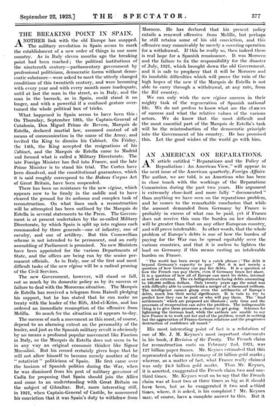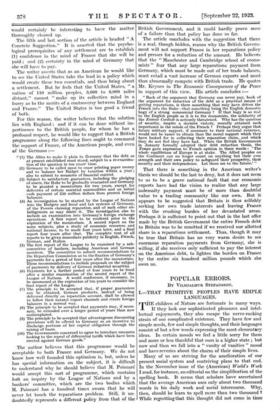AN AMERICAN ON REPARATIONS.
AN article entitled " Reparations and the Policy of Repudiation : An American View," will appear in the next issue of the American quarterly, Foreign Affairs. The author, we are told, is an American who has been in close touch with the workings of the Reparations Commission during the past two years. His argument is extremely close-knit and more fully " documented ". than anything we have seen on the reparations problem, and he comes to the remarkable conclusion that while the amount demanded from Germany by France is probably in excess of what can be paid, yet if France does not receive this sum the burden on her shoulders will be greater than that on any other European country, and will prove intolerable. In other words, that the whole problem of Europe's debts is one of how the burden of paying for the War can be spread equitably over the various countries, and that it is useless to lighten the load on Germany if this means casting an intolerable burden on France.
" The world has been swept by a catch phrase : ' The debt is beyond Germany's capacity to pay.' But it is not merely a question of how Germany can pay her debts. It is a question of how the French can pay theirs, even if Germany bears her share. It is a question of how all of Europe can meet its debts, internal as well as external. The ex-belligcrents are facing debts amounting to 100,000 million dollars. Only twenty years ago the mind was with difficulty able to comprehend a merger of a thousand millions. The intelligence cannot grasp even the arithmetic of Europe's debts, much less their social significance. It is vain to try to predict how they can be paid or who will pay them. The final settlements' which are proposed are illusions ; only time and the processes of recuperation can solve the problem. The indispensable thing is to give these processes a chance to get going. Schemes for lightening the German load, while the authors are unable to say how France is to work out her end of the problem, result in nothing but the aggravation of Franco-German relations and the progressive destruction of confidence all round."
His most interesting point of fact is a refutation of one of Mr. J. M. Keynes's most important statements in his book, A Revision of the Treaty. The French claim for reconstruction costs on February 2nd, 1921, was 127 billion paper francs. Mr. Keynes estimated that this represented a claim on Germany of 58 billion gold marks ; whereas, as a matter of fact, what France really claimed was only 24.8 billion gold marks. Thus Mr. Keynes, it is asserted, exaggerated the French claim two and one- third times. Mr. Keynes went on to say that the French claim was at least two or three times as big as it should have been, but as he exaggerated it two and a-third times, where, it is asked, is his complaint ? Mr. Keynes may, of course, have a complete answer to this. But it would certainly be interesting to have the matter thoroughly cleared up. The fifth and last section of the article is headed " A Concrete Suggestion." It is asserted that the psycho- logical prerequisites of any settlement are to establish (1) confidence in the mind of France that she will be paid ; and (2) certainty in the mind of Germany that she will have to pay. The writer asserts that as an American he would like to see the United States take the lead in a policy which would create these two essentials, and thus bring about a settlement. But he feels that the United States, " a nation of 110 million peoples, 3,000 to 6,000 miles distant," cannot " make up its collective mind in a hurry as to the merits of a controversy between England and France." The United States is too good a friend of both.
For this reason, the writer believes that the solution lies with England ; and if it can be done without im- pertinence to the British people, for whom he has a profound respect, he would like to suggest that a British programme along the following lines ought to command the support of France, of the American people, and even of the Germans :—
The Allies to make it plain to Germany that the debt as at present established must stand, subject to a re-examina- tion of the question in ten years' time. Germany to be called upon to cease printing paper money and to balance her Budget by taxation within a year ; also to submit to measures of financial control.
Subject to satisfactory guarantees, including the pledging of assets, the Ruhr to be gradually evacuated and Germany to be granted a moratorium for two years, except for deliveries of certain essential commodities and an initial cash payment of 250 million dollars from present foreign balances.
An investigation to be started by the League of Nations into the Budgets and fiscal and tax systems of Germany, of the Powers claiming reparation, and of such other ex- belligerents as may desire it. The investigation also to include an examination into Germany's foreign exchange operations. A first report to be rendered prior to the expiration of the moratorium. A second report on the same subjects, plus a study of economic resources and national income, to be made four years later, and a final report four years after that. The complete text of all reports to be given immediate publicity in English, French, German, and Italian.
The first report of the League to be examined by a sub- committee of bankers, including American and German members. The committee to submit recommendations to the Reparation Commission as to the fixation of Germany's payments for a period of four years after the moratorium. These recommendations to include proposals on the subject of payments by delivery of German industrial securities. Payments for a further period of four years to be fixed after a similar examination of the second report of the League of Nations. A world conference, if necessary, to be summoned at the expiration of ten years to consider the final report of the League.
The principle to be accepted that, if proper guarantees can be obtained, German products, instead of being delivered directly on reparation account, shall be allowed to follow their natural export channels and create foreign balances in a normal way. The principle to be accepted that payments may, if neces- sary, be extended over a longer period of years than now contemplated. The principle to be accepted that advantageous discounting provisions will be offered to Germany as an incentive to discharge. portions of her capital obligation through the raising of loans. (10) The Governments concerned to agree to introduce measures looking to the repeal of differential tariffs which have been erected against German goods."
The author believes that this programme would be acceptable to both France and Germany. We do not know how well founded this optimism is, but, unless he has special information on the subject, it is difficult to understand why he should believe that M. Poincare would accept this sort of programme, which contains both an inquiry by the League of Nations and by a bankers' committee, which are the two bodies which M. Poincare has a hundred times sworn that he will never let touch the reparations problem. Still, it un- doubtedly represents a different policy from that of the British Government, and it could hardly prove more of a failure than that policy has done so far. The article concludes with the suggestion that there is a real, though hidden, reason why the British Govern- ment will not support France in her reparations policy and presses for a reduction of the amount. He believes that the " Manchester and Cambridge school of econo- mists " fear that any large reparations payment from Germany, which must be made out of her trade balance, must entail a vast increase of German exports and must thus abnormally compete with British trade. He quotes Mr. Keynes in The Economic Consequences of the Peace in support of this view. His article concludes :- "Back of the argument that Germany can never pay, back of the argument for reduction of the debt as a practical means of getting reparations, is there something that may have driven the French into the Ruhr—that something being the English domestic bogy of a strong commercial Germany f If that bogy is as real to the English people as it is to the economists, the solidarity of the Entente Cordiale is seriously threatened. Why has the question of security, despite a decisive victory, recently attained such importance in the minds of the French f Perhaps they argue that future military support, if necessary to their national existence, would not be easier to obtain than the moral support which they have looked for in collecting their reparation claim, and which they do not feel they have had. When the British Government in January formally adopted their debt reduction thesis, the Temps gave expression to French opinion in these words : "The whole equilibrium of Europe is at stake. The Allied peoples on the Continent can no longer count on anything but their own strength and their own policy to safeguard their prosperity, their security and their independence. Let them see to the future.' " That there is something in the American writer's thesis we should be the last to deny, but it does not seem to us to be a grave national fault that our economic experts have had the vision to realize that any large indemnity payment must be of more than doubtful value to a trading community like our own. But it appears to be suggested that Britain is thus selfishly seeking her own trade interests and leaving France with the crushing burden of her devastated areas. Perhaps it is sufficient to point out that in the last offer made by the British Government the entire French debt to Britain was to be remitted if we received our allotted share in a reparations settlement. Thus, though it may be true that Britain has no very warm desire to see enormous reparation payments from Germany, she is willing, if she receives only sufficient to pay the interest on the American debt, to lighten the burden on France by the entire six hundred million pounds which she owes us.







































 Previous page
Previous page